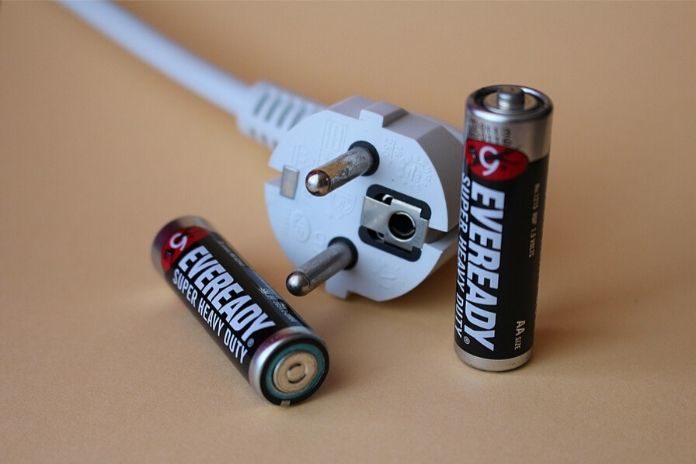
Today, AA batteries are the most common types of cells you are likely to find in circulation. The popularity is probably because they are easily swappable. Often, these cells are used in single-cell devices or combined into pairs when the need to power larger items arises.
With their versatile nature, there is always the curiosity of what is inside of AA batteries? Well, they are made up of the outer steel container that houses the battery’s ingredients, which include:
● Cathode
● Separator
● Anode
● Electrolyte
● Collector
The cathode in these cells is made up of a combo of carbon and manganese dioxide. Then, there is the non-woven fibrous fabric (separator) that works by separating the electrodes. Then, there are the oxidized electrodes (anodes), which are made up of powdered zinc metal.
There is also the electrolyte (a solution of potassium hydroxide), which acts as a medium for the movement of ions within the battery. Also, there is a pin in the middle of the cell, which acts as a collector to help with the conducting of electricity to the external circuit. All these parts work hand in hand to help facilitate the chemical reactions and conduction of electricity.
How Do AA Batteries Work?
If you can recall, back in your high school days, you did learn that electricity is the flow of electrons through a specified circuit. Well, the truth is that AA batteries do operate under similar criteria. As said earlier, these cells comprise a cathode, an anode, and an electrolyte. The three parts happen to be significant as they aid the entire operation of the cell.
The cathode (positive) and the anode (negative) are hooked up to an electrical circuit to perform the production of electricity. How does that happen, you may ask?
Well, at first, there is a chemical reaction inside the battery and which triggers the accumulation of electrons at the anode. This chemical reaction causes an electrical difference between the two terminals. In simpler terms, the electrochemical reaction causes an unstable build-up of the particles.
While trying to get rid of the unstable build-up, electrons repel each other going to a place where there are few electrons. The only place they can go to is to the cathode. The potassium hydroxide solution prevents the particles from going straight from the anode to the cathode. When the circuit is closed, the electrons can get to the cathode and hence performing the task needed, lighting a bulb along the way, for instance.
The electrochemical reaction changes the chemicals in the anode and cathode, stopping them from supplying electrons. By doing, they limit the power available in the AA battery. When recharging the battery, you change the direction of the flow of electrons. The electrochemical reactions happen in reverse. Therefore, recharging helps restore the original state of anode and cathode.
Are AA Batteries Dangerous?
As said early, the use of AA batteries is common as they help with powering the most common electronics in the market today. With their versatile use, there is a rising concern of whether the batteries are dangerous for use or not. Well, you can’t directly say that these kinds of cells are dangerous. Their safety is dependent on how you use them. If used as per the instructions, you are likely to have no problem at all with them.
As said early, AA batteries consist of an electrolyte, which happens to be potassium hydroxide. In some instances, you are likely to experience battery leakage. Remember, this is acid. If not careful, the acid may cause harm to your skin. It’s for this reason that you are advised to clear the leakage in the safest possible.
If you accidentally come into contact with the substance, be sure to clean it up with plenty of water. The cleaning helps neutralize the acidity. Also, you are expected to dispose of the battery correctly, as they can mean harm to the environment.
Can AA Batteries Cause a Fire?
Now and then, you have heard of cases of fires caused by batteries. Most of these incidences leave battery users cautious when it comes to picking the right choice. There is always the question of whether AA batteries can cause a fire. One thing to note is that AA batteries are alkaline, meaning that there is an electrolyte enclosed in the casing.
Back to the question of whether these batteries can cause a fire, you can say that they can, but rarely. When alkaline batteries heat up or are exposed to much electrical current, there is an accumulation of hydrogen gas. As the vapor in the cell continues to build-up, the external casing is likely to rupture. In most cases, the housing will leak, but it can explode if the pressure build-up is plenty.
Most alkaline batteries are vented to allow the heat and energy build-up to dissipate. As a result, they rarely explode when used in a high-heat environment. If the explosion happens when the battery is in a junk drawer, box, or garage, it can ignite the surrounding materials and hence a fire breakout.
You can prevent the fire breakouts from happening in the first place by observing various precautions. First, you ought to store the batteries in a cool and dry place. Also, you can keep the batteries in their original casing to prevent the posts from coming into contact with metal or other cells. You can also cover the posts with tape to avoid unwanted contact.
What Happen If You Lick an AA Battery?
Licking of batteries is one of the few old myths that never fade. Often, you may find yourself licking the cell to confirm if it has some juice in it. When licking the batteries, it’s good to be cautious as some kinds of cells can mean harm if not careful. This always leaves many people curious if the AA type of battery can expect any damage when licked. Well, the truth is that nothing can happen when you lick an AA battery.
With this kind of battery, your tongue can’t touch both the positive and the negative terminals at the same time. However, there are instances when you may lick a leaking battery. If you find yourself in such a mess, don’t be quick to clean your tongue or drink any water. The effects of a leaking battery are dependent on the kind of battery. Say, for instance, Zinc chloride batteries mean no harm if licked.
Do AA Batteries Contain Lead?
Lead is one of the few commonly used metals today. However, if not careful, the same metal can mean harm to both the environment and your general health. Recently, there have been campaigns to create awareness about the effects of this metal. The campaigns have somewhat seen the cases of lead poisoning reduce. But, still, the problem is there are thousands of people who tend to be victims of lead poisoning every year.
Often, batteries have been known to be a significant source of this harmful metal. This relation usually leaves many people asking if the AA batteries contain any lead in them.
Well, the good news is that these batteries contain no traces of the said metal. AA batteries are made up of steel and a combo of zinc/graphite/potassium/manganese. The remaining part is made up of plastic and paper. All these ingredients are non-toxic and hence safe for both the environment and human beings. Besides, the elements are easily recyclable.
Are AA Batteries Lithium?
When buying AA batteries for your next replacement, you can expect some confusion when it comes to picking the perfect choice. Apart from the many manufacturers in the market, you will have to juggle in between the many options available in the market. The most common type is the rechargeable batteries.
Also, there are alkaline batteries, regarded as a standard type of cell as well. AA batteries are also lithium. When talking about lithium batteries, don’t get confused between lithium batteries and lithium-ion ones.
The li-ion batteries re rechargeable and are usually found on phones, laptops, drones, and vaping devices, among many other items. Lithium batteries, in this case, aren’t rechargeable. Instead, what they offer is a long-lasting and sturdy kind of battery that you can rely upon for daily use.
Conclusion
With the many changes taking place in the world of tech today, you can expect to have a new set of electronics making its way into the market. Well, these electronics need power and which comes from the batteries.
AA batteries are the most commonly used batteries in the market today. Understanding how these kinds of cells function are vital. Explained in this article is everything you should know about AA batteries. By reading the entire, you will know everything from the essential ingredients to how the cell operates.





